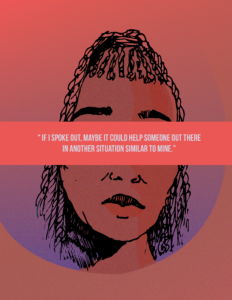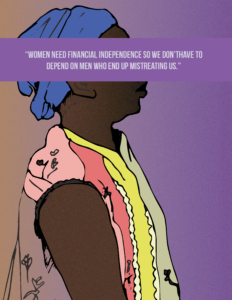Whenever one speaks up, whether it is immediately after the abuse or years later, the first question a survivor of violence faces is “did you report it?” or “Why did you not report it?” Yet, when violence against women and girls is reported, survivors are met by a failing system at best and more violence at worst. In Uganda, the Annual Police Crime Report shows an alarming ratio of 19 convictions for 1519 rape cases reported in 2020. This is the justice system survivors are asked and expected to turn to for help.
This year, Akina Mama wa Afrika (AMwA) has worked with feminist journalist Alice McCool to bring five stories of survivors of sexual; a six-year-old, a 23-year-old university graduate, a 25-year-old refugee, a 39-year-old police officer, and a 41 one-year-old domestic worker. This #16DayOfActivism AMwA is partnering with African Feminism to share these stories to highlight the challenges and demand accountability for the glaring failure of Uganda’s justice system to support the survivors. In the pursuit of justice and confronting both state and social barriers to accountability for sexual and gender-based violence, there’s need to rethink responses to violence against women towards more survivor-centered approaches. We join the rest of the world in the collective call to end violence against women and girls NOW!
 Mirembe, 23, sexual harassment and assault survivor
Mirembe, 23, sexual harassment and assault survivor
“When I finished university it was difficult to get work, so I was excited when I got an interview with a good organisation. But after the interview, the director, Kato, kept pestering me to see me. He started making advances, saying ‘I like you, you’re beautiful, maybe I can even get you a better job than the one you applied for.’ I told him no, I wouldn’t want to be given a job because someone thinks I am pretty. What would my workmates think about me if I got a role I was clearly not qualified for?
The first time it happened was in his car. Kato had taken me on a tour of the organisation after everyone had left. A dog came around and was barking. I fear dogs, so I rushed back into the car. He followed me inside and locked it. He started stroking me and saying how attracted he was to me, but I kept saying no, I wouldn’t be comfortable with moving out with a married man. Kato said he’s not happy with his wife, and that he wants to build something with me. Finally I said maybe I’ll think about it, but not now, so let’s go home.
He refused, and tried to kiss me. Then he adjusted the car seat, and pulled up my skirt. We had a struggle, but he has really big arms so he held me and came to my seat. He kissed me, touched me and forced me to have sex. I just kept quiet, and then started to cry. Kato told me not to tell my family anything, and to go to the doctor the next day to make sure I’m not pregnant. When I visited the family doctor he told me I had an infection and needed medication.
Kato told me I had got the job, and we continued to have sex, but I felt used. I didn’t have that excitement I had before about the job, when I thought people would appreciate me for my knowledge and my skills. But later, he changed his mind anyway. He started to push me away, saying it wouldn’t be comfortable to work in that environment because of his wife.
I reported him for sexual harassment, but Kato also launched a police case against me after my family confronted him about what he had done. One time I was held at the police station, officers were on the phone talking to Kato asking him to give them more money. At some point, one police officer showed me his WhatsApp messages with him – they wrote to Kato saying that ‘the mission is complete’ and ‘I want my final payment.’ After one meeting we had with police and our lawyers, I even saw Kato give the police officers cash. Another time, one officer called me saying he was paid to arrest me and that if I paid him more the case against me would be dropped. He asked me for different amounts of between two and three million shillings ($600-700).
Eventually, I was detained in prison for two months during lockdown, and again and again was denied access to a lawyer and bail. My lawyer reported the police officers involved for invasion of privacy, harassment and illegal phone tapping, under the instruction of Kato. The case he has against me is ongoing, but my case against him is not moving in the court.
When I tried to talk to Kato about everything, he just rubbished me like it’s not anything. To him, he thinks he can get away with it so I was wasting his time. But I thought if I spoke out, maybe it could help someone out there in another situation similar to mine.”
 Esther, 41, intimate partner violence survivor
Esther, 41, intimate partner violence survivor
“I travelled from the village to Kampala to visit my sister who was working in the city as a housemaid. I fell in love with her neighbour, and took him to meet my family. Two months after meeting, Robert and I moved in together, though we were not yet legally married.
Things started to go wrong after I gave birth to our child. The pregnancy almost killed me, and the baby was unwell. I thought it was because we hadn’t named him, which is tradition, but even after we gave the baby a name he was still getting sick. Whenever I took our child to hospital, Robert would never come with me. The doctor said he should be reported to the police for neglecting us, but I said no – I didn’t want him to go to prison.
When he was 7 months old and still sickly, Robert started beating me, saying that a child like this could not be his. I still get migraines from all the times he hit my head against the wall. He would hurt our baby too. The one thing they would always tell me at the government hospital was to leave Robert.
One time after he strangled me I went to the police, who could see my swollen neck. They called Robert and our LC (Local Councillor), but they refused to come. The problem is that all these people respect Robert as an older man in the community. So I tried a bigger police station, who told the local station to work on my case – but when I went back there, they asked me for money to file the case.
After some years, Robert left me for another woman. He took her to a house we had bought together, and left me at our old place. One day, I asked Robert’s son – who is now an adult – for money to help clean the toilet. He attacked me and tried to remove my eye, leaving a wound on my face. The son often told me that if Robert didn’t take my life, he would.
I ran to the police at about 9 pm that night, but the Child and Family Protection Officer wasn’t there, and I was told I needed a hospital letter to report my case. The next day, two officers came with me to arrest the son, but Robert was there. He said ‘my son isn’t going anywhere,’ and I watched him bribe the police officers with 10,000 Shillings ($2.50) to leave. Robert told me that he will always win because he is educated and I am not.
Every time I went to our LC for help, he’d tell me to talk my issues through with Robert and be a good wife. Robert would always give the chairman money, but at some point he realised Robert might kill me, and told me to get help. He said there was no point going to the police, and that nobody in our community had the power to protect me, so he gave me a phone number he had seen on TV for women in violent relationships. This is how I ended up at this shelter, and even speaking to the Minister for Youth and Children on the TV station. The Minister told me to go to the police and get an agreement for Robert to take care of the child, though I can’t claim more than that because we never legally married.
The police should be less corrupt, and help people without asking for money. I have even heard that if you are a poor person you can’t afford to go to court, which needs to change. Hospitals should be better equipped with the medicine that women like me need when we need it. Finally, women need financial independence so we don’t have to depend on men who end up mistreating us.”

 Mirembe, 23, sexual harassment and assault survivor
Mirembe, 23, sexual harassment and assault survivor Esther, 41, intimate partner violence survivor
Esther, 41, intimate partner violence survivor